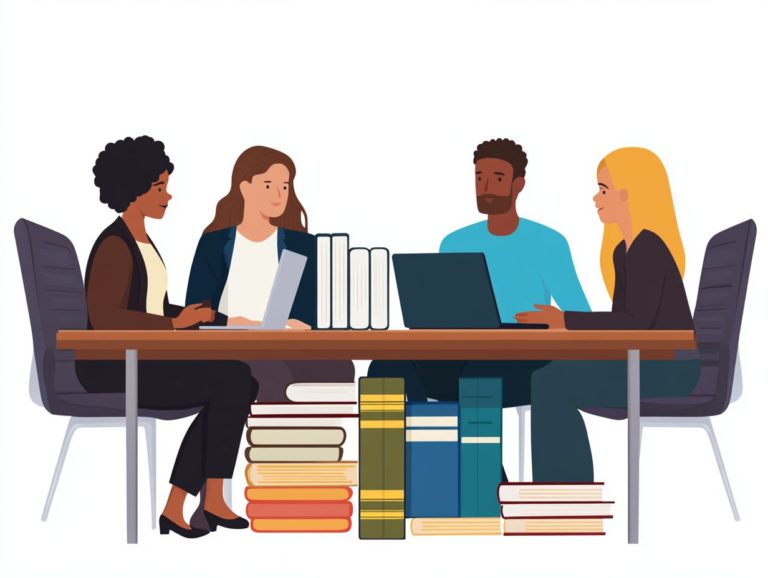How to Assert Your Rights Effectively
Knowing your rights is crucial. It helps you navigate life’s complexities, whether at work or in personal situations.
This article explores various types of rights and their significance, highlighting scenarios where asserting them is essential.
You will find practical steps for effective communication, the potential repercussions of silence, and strategies to cultivate assertiveness in your daily interactions.
Equip yourself with the knowledge and confidence to advocate for what you truly deserve. Jump in and take charge of your future now!
Contents
Key Takeaways:

Understand your rights! They’re crucial at work, in legal matters, and in everyday life.
Communicate effectively and assertively to assert your rights, using strategies and tips from how to communicate your rights to authorities to build confidence.
Failure to assert your rights can lead to negative consequences, making it vital to practice assertiveness in daily life.
Understanding Your Rights
Understanding your legal rights is essential, especially during police encounters. Asserting these rights can greatly influence the outcome of your interactions with law enforcement officers.
Whether you’re facing criminal charges, a traffic stop, or a workplace dispute, knowing your civil rights enables you to advocate for yourself and protect against violations.
Understanding emotional conflict and communication styles helps you stand your ground respectfully while remaining assertive. This foundational knowledge also highlights the importance of having a lawyer by your side during critical moments.
Types of Rights and Their Importance

Legal rights encompass protections designed specifically for you, including civil rights that shield you from discrimination and retaliation, as well as workplace rights that ensure a safe working environment.
These rights form the bedrock of a just society, enabling you to assert your freedoms and seek recourse when violations occur.
It’s crucial to understand how these protections relate to attorney-client privilege. This privilege means that you can talk freely with your lawyer without fear that your secrets will be shared.
Additionally, emotional intelligence is vital in navigating legal situations. It helps you communicate effectively and manage the often tumultuous dynamics of legal disputes.
Ultimately, having a comprehensive understanding of your legal and civil rights equips you to assertively defend your rights, ensuring that your voice resonates in matters of justice.
Common Situations Where Asserting Your Rights is Necessary
Asserting your rights is vital in various situations, especially during encounters with law enforcement.
Whether dealing with traffic stops or potential discrimination in the workplace, it’s crucial to know how to seek legal assistance and manage emotional conflict.
Being equipped with this knowledge allows you to navigate these challenges with confidence and clarity.
Workplace, Legal, and Personal Scenarios

In workplace settings, asserting your rights is essential for protecting against discrimination and retaliation. This is especially critical when facing challenges like wrongful termination, wage disputes, or harassment.
Outside of work, knowing your rights during interactions with police officers can significantly influence the outcome of a situation.
Life can present unexpected challenges like domestic disputes or unforeseen accidents that may require you to seek legal help.
In these moments, having knowledgeable support enables you to navigate the complexities of the legal landscape and advocate for your interests effectively.
Steps to Effectively Assert Your Rights
To effectively assert your rights, you must adopt a strategic approach that combines assertive communication techniques, strong negotiation skills, and effective strategies for managing stress.
This combination helps ensure your voice is heard. It also makes sure you are respected.
Communication Strategies and Tips

Effective communication strategies can enhance your ability to assert your rights. Focus on assertive behavior and active listening to foster respectful dialogue.
Emotional intelligence is crucial. It helps you manage your emotions and empathize with others. By staying calm and open-minded, you can navigate conflicts constructively.
Using ‘I’ statements promotes clarity and ownership of your feelings. This approach reduces defensiveness in others. Confidence is key; maintain an open posture and steady eye contact to reinforce your assertiveness.
By integrating these strategies, you create a space for dialogue where your rights can be openly discussed and respected.
Consequences of Not Asserting Your Rights
Neglecting to assert your rights can lead to serious repercussions. You might face legal issues and emotional turmoil that increase your stress.
Taking action is essential for protecting your well-being.
Potential Negative Outcomes
Not asserting your rights can result in negative outcomes, including workplace discrimination and retaliation. These situations can lead to emotional distress.
You may experience prolonged harassment or wrongful termination, issues that could have been prevented with timely action. Staying silent can harm your self-esteem and increase stress, affecting your personal and professional life.
Ignoring workplace policies can cost you important benefits like fair compensation and humane working conditions. Such repercussions impact not just you, but also workplace morale, creating a toxic environment for everyone.
Practicing Assertiveness in Everyday Life
Embrace assertiveness every day to boost your confidence and communication skills! It helps you navigate interactions effectively, steering clear of passive behavior and aggressive tactics.
Building Confidence and Assertiveness Skills
Building your confidence and assertiveness skills involves cultivating self-esteem and mastering communication strategies. These skills help you engage effectively in negotiations and resolve conflicts.
Nurturing a positive self-image enhances your emotional intelligence. This allows you to express your thoughts and feelings more clearly, improving your interactions.
Techniques like active listening, maintaining eye contact, and using assertive body language will support your growth. Set realistic goals and view failures as valuable learning experiences to boost your self-esteem.
Engaging in role-playing exercises and mindfulness practices can help you manage your emotions. This makes you more adept at handling challenges and fostering healthier relationships.
Frequently Asked Questions
What does it mean to assert your rights effectively?
Asserting your rights means confidently standing up for yourself in a respectful and professional way. This helps you achieve your desired outcome.
Why is it important to know how to assert your rights effectively?
Knowing how to assert your rights is crucial for protecting yourself in various situations. This skill helps maintain healthy boundaries and communication.
What are some tips for asserting your rights effectively?
To effectively assert your rights, know the laws protecting them. For guidance on this topic, refer to how to effectively assert your rights. Stay calm, clearly state your position, actively listen, and be open to compromises.
How can self-confidence affect your ability to assert your rights effectively?
Self-confidence plays a key role in assertiveness. When you believe in yourself, you’re more likely to communicate assertively in tough situations.
Are there any potential risks when asserting your rights?
Yes, risks exist, such as damaging relationships or facing backlash. Assess each situation and proceed with caution.
Where can I find resources for learning how to assert my rights effectively?
Resources include online articles, books, workshops, and coaching. Seek guidance from trusted mentors who have experience in asserting their rights.
Ready to assert your rights? Start with these tips now!






